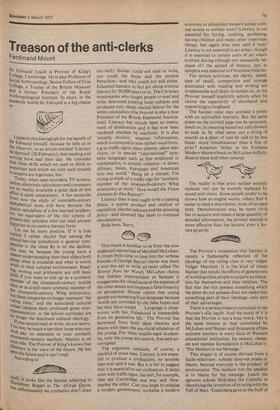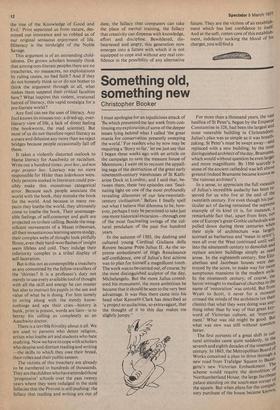Treason of the anti-clerks
Ferdinand Mount Sir Edmund Leach is Provost of King's College, Cambridge. He is also Professor of Social Anthropology, Senior Fellow of Eton College, a Trustee of the British Museum and a former President of the Royal Anthropological Institute. in short, in the
academic world Sir Edmund is a big cheese or
append this hieroglyph for the benefit of Sir Edmund himself, because he tells us in the Observer, in an article entitled 'Literacy be damned' (20 February), that reading and writing have had their day. He concedes that these skills which we used to think so Important and which we took such trouble to acquire are ingenious, but : Today, when tape recorders, TV screens, radios, electronic calculators and computers are so readily available a great deal of this effort is quite unnecessary. A few centuries frurn now the study of twentieth-century alphabetical texts will have become the quaint specialism of a few learned academics, the equivalent of the tiny coterie of P,..,resent-day scholars who can read ancient E.gY,Ptian in its cursive hieratic form. Let me be more positive. If it is true 'I,nch I rather doubt) that among the sch°01-leaving population a general comPetence in the three Rs is on the decline, this may be because the young have a clearer understanding than their elders both about , what is available and what is worth Willie in their cultural environment. Read writing and arithmetic are still basic Skulls if you want to end up as a synthetic nt, ember of the nineteenth-century middle 'class or as a still more synthetic member of
nineteenth-century Whig aristocracy,
▪ ,t. these Categories no longer represent 'the ' thing class,' and the associated cultural values (despite their continued gross overrepresentation in the school curricula) are no longer the dominant cultural ideology.' If You cannot read or write, do not worry. APlay be much wiser than those who can. .11d Pay no attention to your synthetic nineteenth-century teachers. History is on Ylo.ur side. The Provost of King's knows that I literacy is the wave of the future. He has seen the future and it can't read. According to (well, it looks like the leeches adhering to Humphrey Bogart in The African Queen, but unfortunately we synthetics don't draw too well), Homer could no read or write, nor could the Incas and the ancient Peruvians—and they could not add either. Educated humans in fact got along without literacy for 50,000 years or so. The Christian missionaries who taught people to read and write destroyed existing local cultures and produced only cheap clerical labour for the white colonialists (the Provost is also a past President of the British Humanist Association). Literacy has mostly been an instrument of domination and it has now been rendered obsolete by machines. It is also 'socially divisive,' whereas 'information, which is conveyed in non-verbal visual form, e.g as traffic signs, silent cinema, silent television, or in special "international" symbolic languages such as that employed in mathematics, is socially cohesive—it draws African, Asian, European and American into one world.' Hang on a minute, I'm trying to think of a traffic sign for `synthetic member of the nineteenth-century Whig aristocracy at work.' How would the Vision On team do Das Kapital?
Literacy then is and ought to be a passing phase, a quaint product and catalyst of capitalism, like the railways and the spinning jenny—and doomed like them to eventual obsolescence.
Stale buns. Sorry,
This thesis is familiar to us from the now neglected vapourings of Marshall McLuhan. It creeps from time to time into the verbose frenzies of George Steiner (never was there a man less apt to write an essay called The Retreat from the Word). McLuhan claims that literacy impoverishes us because it exaggerates the visual sense at the expense of the other senses and imposes a false linearity on perception. Steiner claims that young people are retreating from language because 'words are corroded by the false hopes and lies they have voiced. . , Language is closewoven with lies. Falsehood is inseparable from its generative life.' The Provost has borrowed from both these theories and shares with them the uncritical adulation of the young. For these middle-aged academics, only the young are sincere, free and uncorrupted.
The argument contains, of course, a stackful of straw men. Literacy is not essential to produce a civilisation; no sensible man ever said it was. But it is fair to suggest that it is essential to our civilisation. It helps even with traffic signs, the sort, for example, that say Cambridge one way and Newmarket the other. Can you hope to criticise a modern government, revitalise a modern economy or administer modern justice without access to written texts? Literacy is not essential for loving, cooking, gardening, having children and many other important things, but again who ever said it was? Literacy is not essential to art either, though it is essential to certain sorts of art which evolved during (though not necessarily because of) the spread of literacy, just as tempera was essential to Florentine frescoes.
For certain activities, the clarity, speed, ease of recall, comparison and storage associated with reading and writing are irreplaceable and likely to remain so, as the Provost himself implicitly admits when he claims the superiority of shorthand and typewriting to longhand.
The human voice may animate a poem with an unrivalled intensity. But the same poem on the printed page can be savoured, dwelt on, its meaning teased out and allowed to soak in. En what sense can a string of sounds or a piece of tape be said to be less linear, more 'simultaneous' than a line of print ? Jonathan Miller in his Fontana Modern Masters book on McLuhan skilfully dissects these and other canards.
The reality is that print neither entirely replaces nor can be entirely replaced by sound and vision. Some people prefer to be shown how an engine works, others find it easier to read a description, most of us need both. Demonstration may be more vivid but to acquire and retain a large quantity of detailed information, the printed manual is more effective than the lecture, even a lecture given by The Provost's contention that literacy is merely a fashionable reflection of the ideology of the ruling class is very vulgar Vulgar Marxism. It is the kind of cheap blather that mocks the efforts of generations of working-class people to acquire an education for themselves and their children. The fact that the rich possess something which the poor do not possess does not make that something part of their ideology, only part of their advantages.
There is a serious treason contained in the Provost's silly squib. And the worst of it is that the Provost is not a lone twerp. His is the same treason as that committed by McLuhan and Steiner and thousands of less eminent teachers in every kind of Western educational institution. Its neatest, cheapest and nastiest formulation is McLuhan's: 'The Medium is the Message.'
This slogan is of course derived from a facile relativism: nobody deserves praise or blame, because everyone is the product of environment. The medium not the speaker is to blame for the message. Leach the agnostic echoes McLuhan the Catholic in identifying the invention of printing with the Fall of Man. 'Gutenberg gave us the fruit of
the tree of the Knowledge of Good and Evil.' Print separated us from nature, destroyed our innocence and so robbed us of our original sensuous enjoyment of life. Illiteracy is the birthright of the Noble Savage.
This argument is of an astounding childishness. Do grown scholars honestly think that among non-literate peoples there are no treacheries, no massacres, no exploitations by ruling castes, no bad faith ? And if they do not honestly think so or do not bother to think the argument through at all, what makes them suspend their critical faculties here ? What inspires this violent, irrational hatred of literacy, this vapid nostalgia for a pre-literate world ?
Any fool can see the uses of literacy. Any fool knows its misuses too: a dried-up, overliterary view of life, a lack of direct feeling (the bookworm, the mad scientist). But most of us do not therefore reject literacy as a snare and delusion any more than we reject bridges because people occasionally fall off them.
It takes a violently distorted outlook to blame literacy for Auschwitz or racialism. Write out a hundred tithes post hoc, red non ergo propter hoe. Literacy was no more responsible for Hitler than lederhosen were. Only persons soaked in literature could possibly make this monstrous categorical error. Because such people associate the world with the book, they mistake the book for the world. And because in many respects they loathe the world, they ultimately come to loathe the book. Their unassuageable feelings of self-contempt and guilt are projected on to their calling. Beside the magnificent movements of a Masai tribesman, all their mountainous learning seems stodgy, their complex webs of thought look pitifully flimsy, even their hard-won flashes of insight seem lifeless and cold. They indulge their inferiority complex in a tribal display of self-laceration.
But is this not as contemptible a treachery as any committed by the fellow-travellers of the 'thirties ? It is a professor's duty not merely to use every available tool of thought with all the skill and energy he can muster but also to instruct his pupils in the use and value of what he is doing. For him tamely to string along with the trendy knownothings and ape their cries—history is bunk, print is poison, words are liars—is to betray his calling as completely as an Auschwitz doctor.
There is a terrible frivolity about it all. We are used to parsons who detest religion, artists who loathe art and students who hate studying. Now we have to cope with scholars who despise and distrust reading and writing —the skills to which they owe their bread, their robes and their public esteem.
The victims of this treachery are already to be numbered in hundreds of thousands. They are the children who haveattended those 'progressive' schools over the past twenty years where they were indulged in the stale fallacies that the Provost is still pushing: the fallacy that reading and writing are out of date, the fallacy that computers can take the place of mental training, the fallacy that creativity can dispense with knowledge, effort and discipline. Bewildered, disheartened and angry, this generation now emerges into a future with which it is not equipped to cope and without any real confidence in the possibility of any alternative
future. They are the victims of an establishment which has lost confidence in itself. And at the soft, rotten core of this establishment, indolently sucking the blood of his charges, you will find a



































 Previous page
Previous page